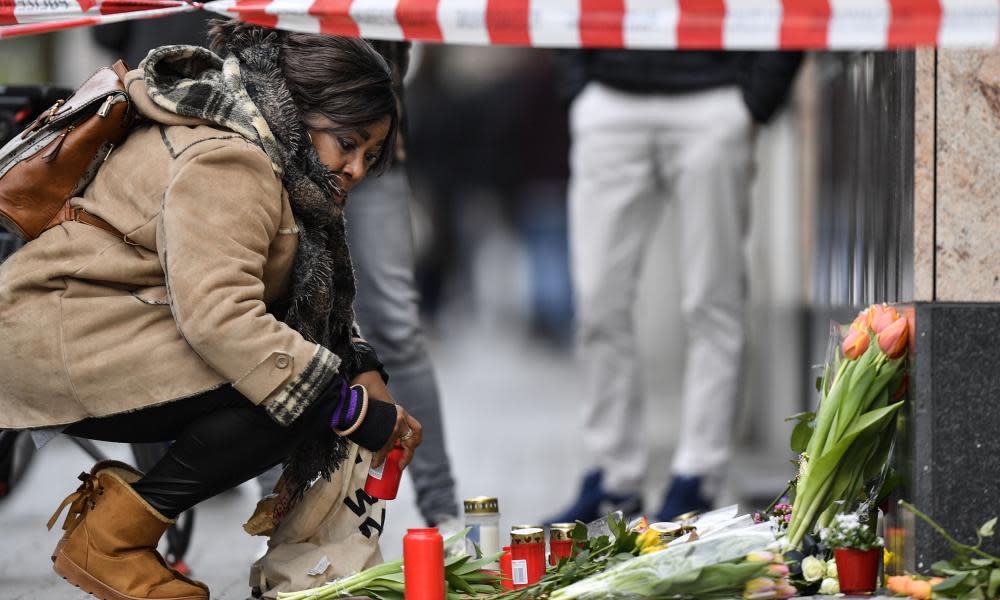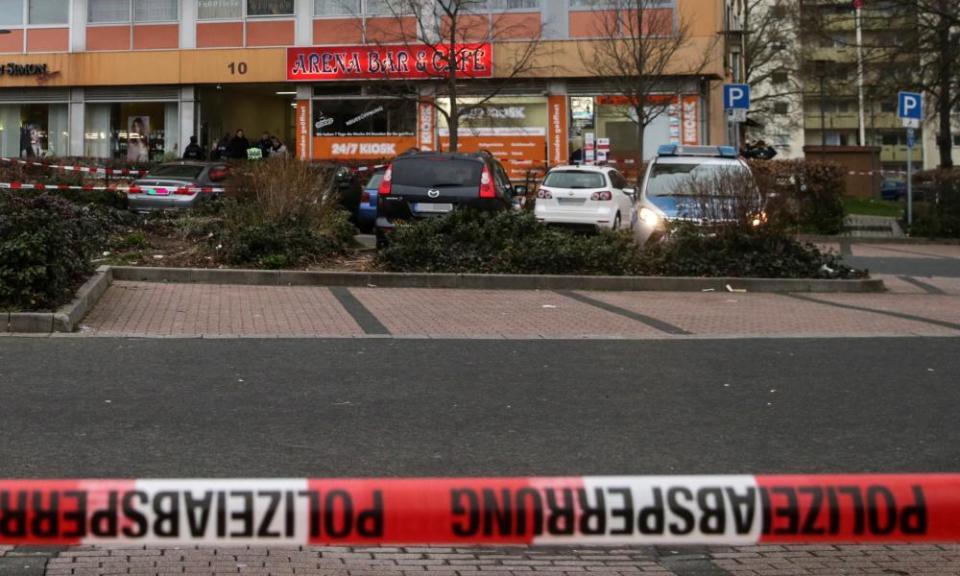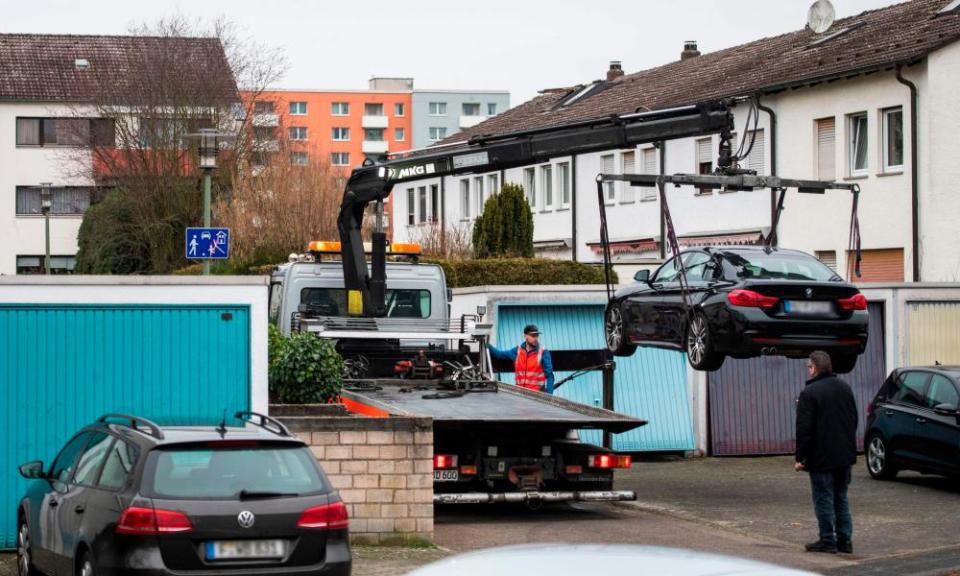'He shot our children': how the Hanau attack unfolded

It was 10pm on Wednesday when the shooting began in the west German town of Hanau. A man burst into the Turkish-owned Midnight bar, not far from the city centre. And then he started killing. First he targeted three guests who were sitting down enjoying a late meal. Then he shot dead the waiter who had just brought them their food, Gökhan Gültekin.
In a matter of seconds, the cafe with its comfortable green leather sofas and hookah pipes was transformed into a scene of bloody carnage. It was popular with locals because it was one of few bars in the area that was open 24 hours a day – a good spot for a drink after work.
“They shot our brothers and children,” the bar’s owner Kemal Koçak said. “Even though we are fine, half our hearts are gone. Gökhan is gone. Everything is gone.”

The suspected murderer was identified as Tobias Rathjen. The 43-year-old appears to have calmly left the cafe after the killing spree and climbed into his black BMW. He drove off, heading west towards the home he shared with his father and mother in the Kesselstadt district. He took his weapon with him, a Glock 17 9mm pistol, bought on the internet. It was a five-minute journey past nail bars, grocery shops, and modern housing blocks.
Far-right racist attacks in Germany are usually associated with the former communist east. Hanau, however, is situated in the west’s prosperous democratic heartland. Frankfurt, the gleaming financial capital, is 15 miles (25km) down the road. Seemingly unnoticed by the police or the authorities, the suspect had harboured his hatred for foreigners and migrants in private before embarking on Wednesday’s horrific and demonstrative acts.
After the shooting, however, the gunman did not go directly home. Instead he headed to Karl-Schumacher Platz and the Turkish-owned Arena bar and cafe. He was spotted checking it out a week or so earlier, according to one unconfirmed account. Itis a quiet spot. Next door to the hookah bar – also open 24 hours – is a beauty salon and a Lidl supermarket; directly above is a multi-tenant apartment block; nearby are hotels and betting shops.

According to German media, he rang the bell at the cafe’s side entrance. Then he strolled inside and opened fire in a crowded smoking area. According to survivors, he sprayed one half of the room with bullets before heading towards the other side. At the time Iskender Muhammad had just started eating and was sitting at the bar with about a dozen friends. They ran for cover. He dived behind an interior wall.
“We heard five or six shots,” Muhammad recalled. “And then I saw the man come towards us. He shot a guy in the head. The guy collapsed on the floor and then the gunman came and shot at us. We hid behind the wall and piled up on top of each other, one after the other, like a ball. From my group, unfortunately, only two or three survived. I was one of them.”
Speaking to Turkish television from his hospital bed, Muhammad said: “I was hit in the shoulder. The young guy beneath me had a hole in his neck. He said: ‘Brother, I can’t feel my tongue, I can’t breathe.’ I said: ‘Say the prayer for your soul.’ He cried out. And then there was silence, just him and me. I didn’t know anything after that or see if the gunman left [the building].”
In a matter of minutes, and in two separate locations, the shooter had murdered nine people. These were coldly calculating and explicitly racist attacks, authorities said. As calls flooded police emergency lines, the suspect drove to his home in Helmholtzstrasse, a mere couple of streets away. He appears to have gone inside and shot his 72-year-old mother dead. His father appears to have escaped.

Rathjen then shot himself. By the time armed police arrived at the front door in the early hours of Thursday – shouting a warning through a loudhailer before blowing off the front door – the suspected perpetrator was already dead. Rathjen’s Glock was found next to his body. It was obtained legally, according to security sources, and was the same weapon used in a previous deadly far-right shooting in Munich in 2016.
Rathjen left behind a rambling, hate-filled manifesto in which he denounces Germany’s ethnic minorities. Uploaded to his personal website, the 24-page text calls for the “complete annihilation” of people from the Middle East, Asia and Africa. He also claims mind readers from an “intelligence agency” have been controlling his deeds and thoughts.
The killer gives no hint of his murderous plan. He does offer a biography of sorts: local school and a bank clerk apprenticeship, followed by a business management degree at Bayreuth University, which he finished in 2007. An ordinary middle-class career path, then, but one that at some point went wildly off track. It ended in far-right conspiracy theory and murder.
On Thursday, residents gathered at the town’s Heumarkt to lay flowers in front of the bar where the second attack took place. “It’s a slap in the face,” said Cem Karahalil, 20, who is childhood friends with one of the men injured inside the Arena bar. Luckily, he said, his friend’s health was improving. Some of those murdered were friends of friends, or former football teammates, he said.
“I am speechless that something like this can still happen in our century. You feel guilty, because you couldn’t do anything to stop what happened, even if maybe we couldn’t have done anything.”
Ahmet Kata, 52, drove his bus past the venue at 10.30pm on Wednesday and had returned on Thursday. “It’s absolutely terrible,” he said with a Hessian accent. “Where does hatred like this come from, that you just shoot people who are just out to have a pleasant time?”

 Yahoo News
Yahoo News 
